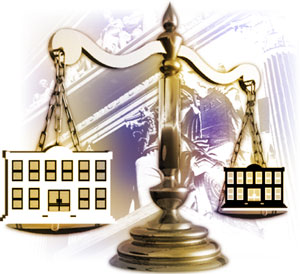
They are drafting legislation to require judges to provide financial disclosure forms to parties that come before them in courtrooms, including who gave political donations, and organizations they belong to and serve on board of directors. The disclosures are already mandated, however, you have to probe the Secretary of State and County Registrar’s Office, said to Atty. Richard Fine.
According to Dr. Shirley Moore, a workers rights activist, and Atty. Fine, the L.A. County Board of Supervisors has authorized annual payments of $40,000 in cash, health and retirement plan contributions to Superior Court judges.
The problem, they claim, is Superior Court judges are already paid by the state currently at a base salary of $178,789. Additional compensation from L.A. County is a conflict of interest, creates undue influence and denies due process to anyone involved in legal fights with the county of Los Angeles, they argue.
According to their petition, an October 3, 2007 letter from the L.A. County Counsel’s Office to the Board of Supervisors indicated, “670 new cases were filed in fiscal year 2007 and 261 dismissals occurred based upon favorable rulings for the County. This is approximately 39 percent. LA County took 24 cases to trial and prevailed in 15. Five were defense (jury) verdicts. This shows that 10 defense decisions were done by the LA Superior Court judges. This is over 41 percent. These are more cases decided by judges against the plaintiffs, than the 9 cases the plaintiffs won at trial before a jury. It appears the plaintiffs did not win any cases before a judge.”
The letter’s statistics did not note the ratio of filed cases to dismissals for non-L.A. County cases, the petition said.
“There really wasn’t any reason for the county to take our money and pay it to the judges when all they had to do was just lobby the state legislature,” Atty. Fine said.
The payments have prompted the duo to ask that all cases heard by judges who received monies from the county be reopened.
“When you go into the courts, these judges should tell you that they are being paid by the state as well as the county, and that money should not have an impact upon how they judged your case, but how could it not? It’s a bribe. They pay these judges so that they can fix the cases and it’s out of control,” Dr. Moore said.
L.A. Superior Court judges are elected and their salaries governed by the state legislature, according to the California Constitution. Dr. Moore and Atty. Fine want a grand jury to investigate the effects of the additional compensation, particularly where judges received money while deciding cases.
They do not believe every case will be overturned, but say it’s important to ensure people get due process.
According to Atty. Fine, the payments date back to 1985, however in 1997, the Trial Court Funding Act declared the County should not make any payments for any trial court operation.
“The concept of a party paying money to a judge has been illegal under the due process clause of the U.S. Constitution forever. A comparison would be if Tony Soprano paid $40,000 to a judge he had a case before. It’s the same thing,” Atty. Fine said.
Atty. Les Tolnai, an assistant county counsel, addressed questions about funding for the County of Los Angeles, which the County Counsel Office represents.
The only reaction to the petition is to welcome an investigation, he said. “We believe that everything that the county has done and continues to do is lawful,” said Atty. Tolnai.
There is no doubt payments and benefits have gone on for years and L.A. County is not the only county in the state that provides additional benefits to the judges, he noted. “What I find troubling is this concept that because monies are paid to judicial officers that somehow they will engage in judicial misconduct,” Atty. Tolnai said.
Payments to Superior Court judges are no different than the state of California making payments to state judges, or the U.S. government paying federal judges–both of whom litigate cases involving government entities, he said.
Dr. Moore told The Final Call she learned about the payments during litigation against the county on unrelated matters.
Atty. Fine discovered the payments in 1999 during a case that charged then District Attorney Gil Garcetti was withholding $14 million in child support money from women and children. As the trial neared closure, the judge dismissed the case, Atty. Fine said.
He researched and found out through the county budget that the judge received a county payment of $30,000. Payments to judges amounted to some $20 million a year, said Atty. Fine.
Another red flag arose when a judge disallowed attorneys’ fees on an $11 million judgment Atty. Fine said he won after proving the county was putting money from environmental inspections into a general fund, instead of a special fund as required by law. In that case, the judge was also receiving county payments, he charged.
Atty. Fine told The Final Call that because of his stance, and motions to disqualify Superior Court judges from hearing two civil rights cases he filed regarding payments to judges, he was retaliated against by the county and the California State Bar Association. He is currently listed as “inactive” and cannot practice law, pending the outcome of appeals.












